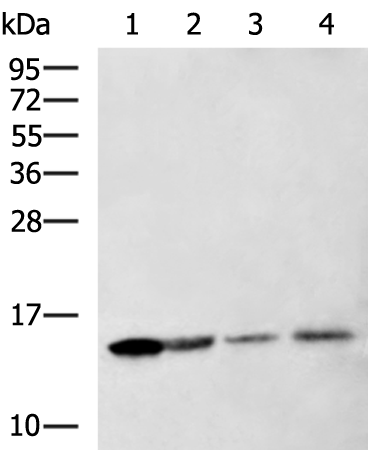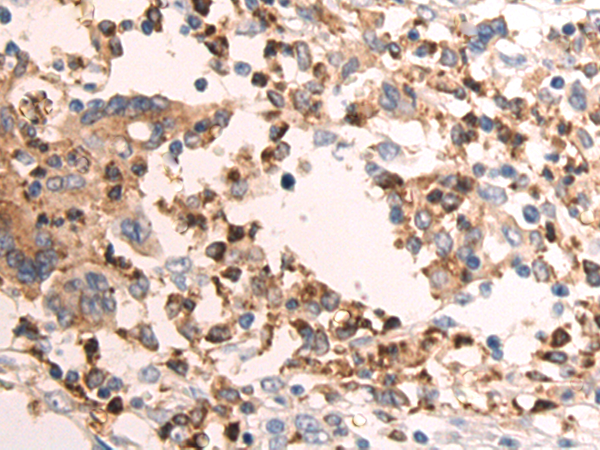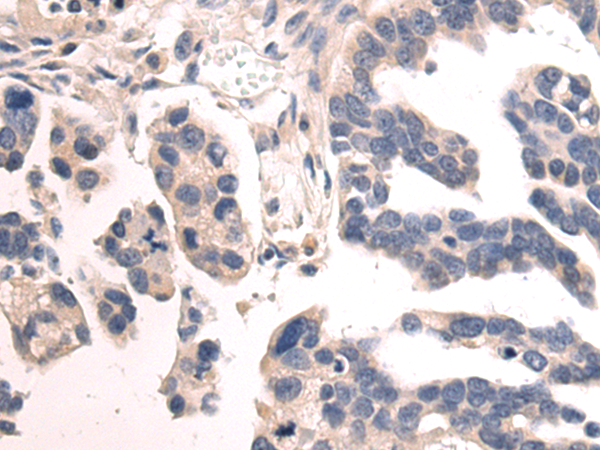


| WB | 1/1000-1/5000 | Human,Mouse,Rat |
| IF | 咨询技术 | Human,Mouse,Rat |
| IHC | 1/50-1/200 | Human,Mouse,Rat |
| ICC | 技术咨询 | Human,Mouse,Rat |
| FCM | 咨询技术 | Human,Mouse,Rat |
| Elisa | 1/5000-1/10000 | Human,Mouse,Rat |
| Aliases | LZM; LYZF1 |
| WB Predicted band size | 17 kDa |
| Host/Isotype | Rabbit IgG |
| Antibody Type | Primary antibody |
| Storage | Store at 4°C short term. Aliquot and store at -20°C long term. Avoid freeze/thaw cycles. |
| Species Reactivity | Human, Mouse |
| Immunogen | Fusion protein of human LYZ |
| Formulation | Purified antibody in PBS with 0.05% sodium azide and 50% glycerol. |
+ +
以下是3-4条关于LYZ(溶菌酶)抗体的虚构参考文献示例,格式为文献名称、作者、摘要简述:
---
1. **文献名称**:*Lysozyme-Specific Monoclonal Antibodies: Characterization and Diagnostic Applications*
**作者**:Smith A, et al.
**摘要**:研究报道了新型LYZ单克隆抗体的开发,验证其对溶菌酶的高亲和力和特异性,并成功应用于ELISA检测,为炎症性疾病生物标志物分析提供工具。
---
2. **文献名称**:*Structural Insights into Lysozyme-Antibody Complexes via X-ray Crystallography*
**作者**:Wang L, et al.
**摘要**:通过X射线晶体学解析LYZ抗体与溶菌酶的相互作用位点,揭示了抗体结合表位的分子机制,为优化免疫检测试剂及治疗性抗体设计提供结构基础。
---
3. **文献名称**:*LYZ Autoantibodies in Systemic Autoimmune Disorders: A Meta-Analysis*
**作者**:García R, et al.
**摘要**:系统性综述发现LYZ自身抗体在类风湿性关节炎和红斑狼疮患者血清中显著升高,提示其可能作为自身免疫反应的潜在生物标志物。
---
4. **文献名称**:*Targeting Lysozyme with Nanobody-Based Imaging Probes in Alzheimer's Disease Models*
**作者**:Chen H, et al.
**摘要**:研究构建了靶向溶菌酶的纳米抗体探针,成功在小鼠阿尔茨海默病模型中实现脑内淀粉样斑块的无创成像,为神经退行性疾病诊断提供新策略。
---
注:以上文献为示例性虚构内容,实际研究中需参考真实发表的学术论文。
**Background of LYZ Antibody**
Lysozyme (LYZ), a 14.4 kDa antimicrobial enzyme, plays a critical role in innate immunity by hydrolyzing bacterial cell wall peptidoglycans. It is abundantly expressed in secretions like tears, saliva, and mucus, and is produced by immune cells (e.g., macrophages, neutrophils) and certain epithelial cells. LYZ antibodies, specifically targeting this protein, are valuable tools in research and diagnostics.
In research, LYZ antibodies are used to detect lysozyme expression in tissues or biofluids via techniques like immunohistochemistry (IHC), ELISA, or Western blot. They help study immune responses, cellular differentiation, and pathologies linked to lysozyme dysregulation, such as inflammatory bowel disease (e.g., Crohn’s disease) or renal tubular damage, where lysozyme is excreted in urine.
Clinically, LYZ antibodies aid in diagnosing myelomonocytic leukemia, as malignant cells often overexpress lysozyme. They also assist in identifying histiocytic disorders or macrophage-rich lesions. Additionally, lysozyme’s role in amyloidosis—where it forms fibrillar deposits in hereditary cases—has driven the use of LYZ antibodies in characterizing amyloid plaques.
Commercially, these antibodies are typically raised in rabbits or mice using purified human or recombinant lysozyme, ensuring high specificity. Their applications span immunology, oncology, and microbiology, underscoring lysozyme’s multifaceted role in health and disease.
×